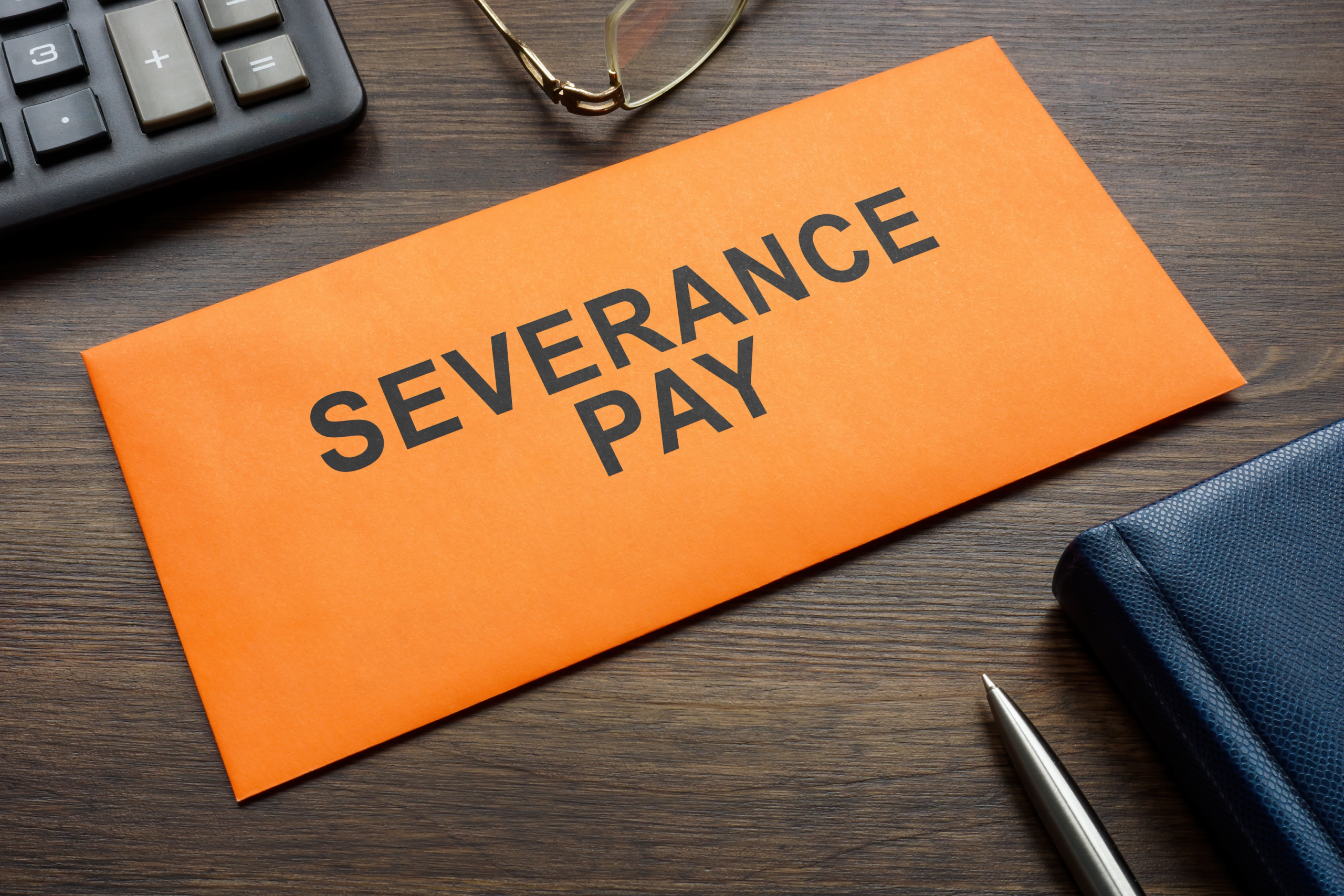
What is severance pay? Essentially, it is compensation given by an employer when you are let go from a job, designed to support you financially as you transition. From how much you should get to understand your rights, this article provides an in-depth look at “what is severance pay,” helping you navigate this pivotal career moment with confidence.
Key Takeaways
- Severance pay serves as financial support post-employment and a tool for companies to prevent legal issues by obtaining waivers of legal claims from departing employees.
- The amount and components of severance pay vary depending on company policy, tenure, and employee’s position; typically including accrued wages, benefits continuation, and sometimes services like outplacement assistance.
- Negotiating a severance package can significantly benefit the employee, and legal counsel is advisable to navigate complex agreements and protect one’s rights, including the potential impacts on future employment and eligibility for unemployment benefits.
If you’ve been offered a severance package, don’t sign away your rights without expert advice. The experienced attorneys at Levine & Blit can review your agreement, negotiate better terms, or take legal action to protect your interests. Call us at 646-461-6838 for a free case evaluation with a New York severance agreement lawyer today.
👉Also Read: Decoding Severance Package: What Every Employee Should Know
Defining Severance Pay: The Basics
When an employment chapter comes to a close, severance pay steps into the limelight as a form of monetary compensation provided by employers to employees. It’s more than just a goodbye handshake; severance pay is a financial lifeline during the transition to new employment or unemployment. The concept is straightforward, yet its implications are wide-ranging, affecting your immediate financial stability and your future career prospects.
As severance agreements come into the picture, gaining a grasp on the intricacies of severance packages becomes significantly advantageous.
Purpose of Severance Pay
Severance pay isn’t merely about money; it’s a strategic tool for companies to maintain goodwill and safeguard their reputation as they part ways with employees. For the employer, it’s an insurance policy against future legal tangles, ensuring a clean break and mitigating the risk of legal claims.
In the context of the employment relationship, employees are often required to waive the right to sue for issues like discrimination or harassment as part of the severance agreement, which underscores the employer’s vested interest in offering such packages in compliance with the employment law and ensuring proper employment contracts according to the employment act.
Common Scenarios for Offering Severance Pay
Certain events trigger the severance pay protocol more than others. Layoffs and corporate downsizing are prime candidates for severance packages, as these scenarios often involve job elimination without fault on the part of the employee. The aim is to ease the blow of sudden unemployment and provide a financial cushion during the job search.
This practice is grounded in practicality and underpinned by a commitment to corporate responsibility.
Factors Influencing Severance Pay Amounts
Severance pay is not a one-size-fits-all proposition. Several factors come into play when determining the amount an individual can expect to receive. Company policies are the bedrock of severance calculation, setting the baseline for what’s on the table.
The duration of service also often influences the payout, with numerous companies offering a week or two of pay for each year of employment. Climbing the corporate ladder can also be a boon; seniority and position influence the generosity of severance packages, ensuring that those in higher positions might receive more substantial sums.
Legal Requirements and Severance Pay
While receiving a severance package may feel like an entitlement, the legal landscape paints a different picture. In most cases, severance is not a legal obligation unless it has been previously agreed upon in an employment contract. New York, for instance, offers additional time for employees over 40 to review severance agreements, providing a 21 to 45-day consideration period depending on the circumstances of the termination. This is indicative of certain protections in place, although younger employees may not benefit from the same statutory review period.
Even without a legal obligation, companies often resort to severance agreements to ensure a smooth termination of employment and sidestep potential legal disputes.
Components of a Severance Package
A severance package can be a mosaic of financial benefits and perks. It often includes:
- Accrued compensation such as unpaid vacation time, sick days, or even bonuses and commissions that have not yet been paid out
- Benefits such as health insurance that extend beyond the employment period
- Specifics about retirement contributions
- Additional perks might encompass life and disability insurance, company resources, or even services like outplacement assistance, which can be invaluable during a job hunt.
For the upper echelons of management, protection clauses such as ‘good reason’ can be a safeguard against significant adverse changes in their role or status.
Pitfalls to Avoid When Accepting Severance Pay
Accepting severance pay without careful deliberation can present numerous pitfalls. One misstep could result in waiving your right to future legal action against your employer. Remember, severance agreements are designed with the employer’s protection in mind, possibly at the expense of your legal rights.
Rushing to accept the initial offer can also risk underselling your worth. Emotions can cloud judgment, leading to overlooked benefits or unrealistic expectations during negotiations. Consulting an employment law attorney can be a game-changer in assessing the fairness of a severance offer and understanding the full implications of any legal rights you might be foregoing.
The Role of an Employment Lawyer in Reviewing Severance Agreements
The maze of legalese and potential consequences within a severance agreement necessitates seasoned expertise. This is where an employment lawyer becomes indispensable. An attorney’s expertise is not limited to unpacking the legalese; it extends to negotiating the full scope of compensation and ensuring that your rights remain intact.
In the intricate ballet of severance agreements, a lawyer acts as your guide, steering you clear of errors and potential conflicts. With legal counsel and a thorough lawyer review, you gain clarity and confidence, knowing that your interests are well-protected.
Negotiating Your Severance Package
Effective negotiation skills can prove instrumental in shaping your severance package. It’s a two-way street, where both review and dialogue with your employer – or better, an employment attorney – play pivotal roles. Patience can be a virtue, allowing your employer to set the initial terms, which can then serve as a foundation for your counteroffer.
Your negotiation strategy can be fortified by highlighting your contributions, the market’s status quo, and the leverage you may have over potential risks to your employer. Tailoring the severance to your career and life stage, coupled with a professional yet assertive approach, can lead to a more favorable agreement. Remember, negotiations can also open the door to benefits not initially outlined in your contract, adding layers of value to your severance package.
Protecting Your Rights as an Employee
Even after stepping into life post-employment, your rights serve as a shield to be used wisely. Non-compete clauses and confidentiality agreements are often part of the severance package and can significantly impact your future prospects. These restrictions should be reasonable and not unduly constrain your career trajectory.
Crucially, severance agreements cannot strip you of your statutory rights or prevent you from pursuing valid discrimination or harassment claims. Even a covenant not to sue, commonly found in these agreements, has its limits and cannot preclude you from making rightful claims.
Navigating Post-Employment Challenges
Embarking on a path beyond your former job can be both challenging and exhilarating. Securing positive references is key to unlocking new opportunities. The blend of excitement and apprehension that accompanies a job transition is natural, especially after leaving a long-term position.
Adapting to new work cultures and environments requires resilience and flexibility. Be aware that severance pay may affect your eligibility for unemployment benefits, a factor that underscores the need for a strategic approach to your severance package in places like New York.
👉Also Read: Maximizing Your Rights: Why Signing a Severance Agreement Matters in Employment Law Cases
Experienced New York Severance Agreement Lawyers Ready to Assist You
Deciphering severance agreements can be daunting, and that’s where our experienced team at Levine & Blit comes into play. Our legal team is poised to review your severance package, ensuring you don’t inadvertently compromise your rights. Renowned for our legal savvy and adept negotiation skills, we stand ready to advocate for your best interests, whether that means negotiating with your former employer or taking your case to court if necessary.
To discover how our expertise can serve you, don’t hesitate to reach out for a free case evaluation with one of our New York severance lawyers. Call us today at 646-461-6838 or contact us online to get started.

